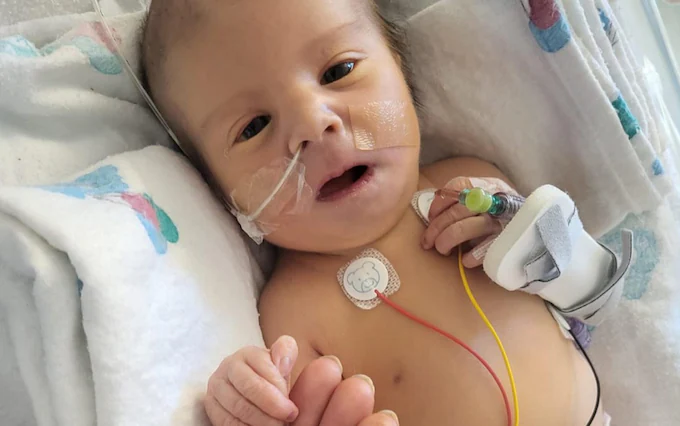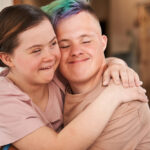Abortion
Why does the U.K. sentence some disabled babies to death?
A Christian legal group in England has come to the aid of parents desperate to ensure their disabled children continue to receive life-supporting care, much to the disgust of those who believe such children are better off dead.
On November 13, Indi Gregory, a baby girl diagnosed with a mitochondrial disease, died after a UK judge barred her parents from taking her to Vatican City’s children’s hospital for further treatment and ruled instead that her life support be removed.
According to doctors at Nottingham University Hospital, Indi was virtually brain-dead. According to her parents, however, Indi was disabled but still responded to them and “on her good days she is babbling, making noises, moving all her limbs. She can definitely experience happiness.”
Indi and her family attracted sympathy in high places. Italian Prime Minister Giorgia Meloni had supported their failed bid to continue her treatment.
On April 28, 2018, 23-month-old Alfie Evans died in Alder Hey Children’s Hospital after a British court also blocked his parents from taking him to Italy for offered treatment, ruling that it was not in Alfie’s “best interests.” The doctors had claimed that Alfie would die after being taken off the ventilator; instead, he began breathing on his own. For the first 22 hours, Alfie wasn’t given food. He survived four days off the ventilator, leaving his doctors “gobsmacked.” Nonetheless, his parents were denied even the right to take Alfie home to die. A Polish doctor stated that he might have been misdiagnosed. But even when Alfie was granted Italian citizenship, the NHS refused to release him.
On July 28, 2017, 11-month-old Charlie Gard died of a rare genetic condition the day after he was removed from a ventilator. His parents had fundraised nearly 1.4 million pounds to take him to the United States to undergo a therapy trial, but UK doctors refused to let him leave the hospital and UK courts blocked Charlie’s parents from taking him out of the country for further treatment. A last-ditch appeal to the European Court of Human Rights failed. Similarly, on August 6, 2022, 12-year-old Archie Battersbee died after both UK courts and the ECHR denied his parents’ request to take him elsewhere for treatment after doctors in both Italy and Japan had offered to treat him.
In the wake of these gut-wrenching cases, the Guardian has run a story this week claiming that “medics treating critically ill babies are quitting their jobs owing to ‘considerable moral distress’ caused”… not by the spectre of parents being legally barred from taking their children for further treatment at other medical institutions where medical professionals are willing and eager to do so but “by a right-wing Christian group behind a series of end-of-life court cases.”
The Guardian believes the problem is not a legal regime that facilitates these scenarios but the Christian Legal Centre, an organization seeking to help parents navigate that regime. From the Guardian:
A court of appeal judge this month expressed “profound concern” about the use of “manipulative litigation tactics” in the case of Indi Gregory, a critically ill baby girl who died on 13 November after a legal battle over her treatment. It was the latest in a series of high-profile end-of-life cases brought by the campaign group Christian Legal Centre (CLC), which also represented the parents of Charlie Gard, Alfie Evans and Archie Battersbee. Andrea Williams, chief executive of the CLC, said it was “highly perverse” to accuse the company of prolonging suffering because “we do not bring the legal proceedings, they [the NHS trusts] do.”
The Guardian claimed that one of the Italian senators seeking to assist baby Indi’s parents in bringing their daughter to the Vatican’s children’s hospital was “right wing” — using the term as a pejorative — and quoted Lord Justice Peter Jackson saying that he was concerned that legal challenges by Indi’s parents “had distracted attention from the gravely ill baby.” The legal challenges, of course, were brought on behalf of the gravely ill baby and had, in fact, brought international attention to her plight — but Jackson stated further that the legal proceedings had been “extremely challenging” for the medical professionals who were refusing to release Indi to another hospital. Professor Neena Modi, the president-elect of the European Association of Perinatal Medicine — and a beneficiary of the Nestle corporation — went so far as to claim that the CLC “preys on parents when they are at their most vulnerable.”
The Guardian concluded both by placing the tiny but feisty CLC at the heart of a vast right-wing conspiracy and, perhaps inadvertently, by pointing out why some parents have so badly needed its help:
The Christian Legal Centre, part of Christian Concern, is at the centre of a well-funded international nexus of right-wing evangelist groups who oppose LGBTQ+ rights, abortion and same-sex marriage. Until August, families at the centre of distressing end-of-life cases were not entitled to public funding, an obstacle described as “scandalous” by a high court judge in the Indi Gregory case.
We know that medical professionals make mistakes. We know that they are fallible. When other highly-qualified medical professionals are willing to give second opinions and offer further treatment at prestigious children’s hospitals, what possible justification is there from legally preventing parents — who love their children more than anyone in the world — from taking them to other willing doctors? Why are judges considered qualified enough to make medical judgments that ultimately decide the fate of children — and their bereaved parents? The Guardian does not even bother to ask those questions, much less answer them. Instead, they settle for accusing a Christian legal group assisting desperate parents of causing “moral distress” simply for doing so. It is unconscionable.








